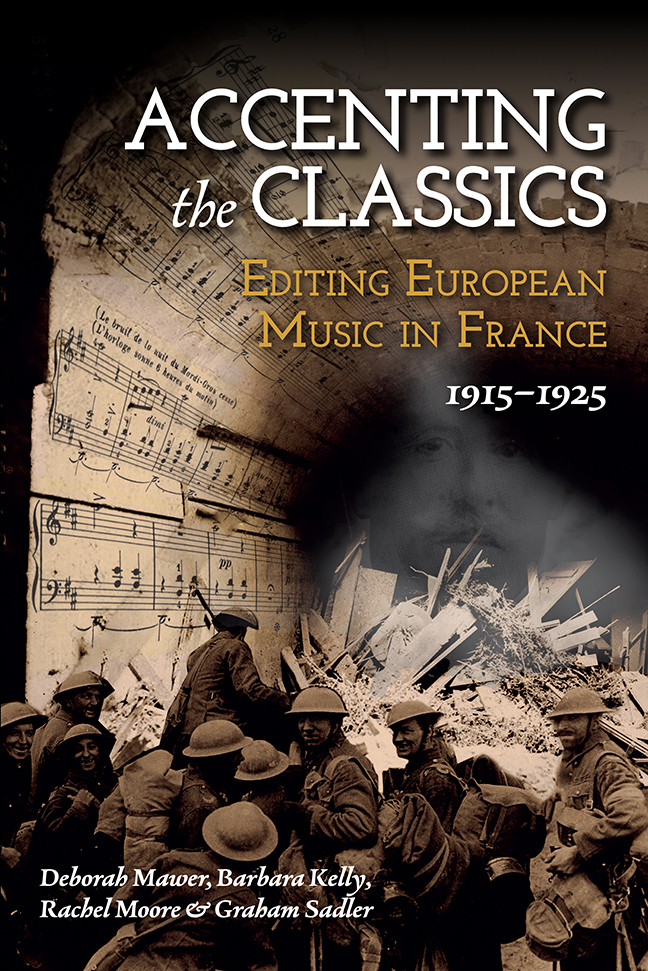Book contents
- Frontmatter
- Contents
- List of Figures
- List of Tables
- Notes on Co-authors
- Acknowledgements
- List of Abbreviations
- Note on the Text
- Introduction
- Part I Durand and His Édition Classique
- Part II Composer–Editor Case Studies
- Part III Beyond Editing: Pedagogy, Performance, Composition
- Afterword
- Select Bibliography
- Index
6 - Accenting Bach: An Editorial Trajectory from Fauré to Roger-Ducasse
Published online by Cambridge University Press: 10 January 2024
- Frontmatter
- Contents
- List of Figures
- List of Tables
- Notes on Co-authors
- Acknowledgements
- List of Abbreviations
- Note on the Text
- Introduction
- Part I Durand and His Édition Classique
- Part II Composer–Editor Case Studies
- Part III Beyond Editing: Pedagogy, Performance, Composition
- Afterword
- Select Bibliography
- Index
Summary
This chapter picks up on the cultural theme of Franco-Germanic transnational musical dialogue introduced in Chapter 2. Its focus is on several editions of J. S. Bach found within the large-scale keyboard-and-instrumental collection of the Édition Classique across 1915–24 – that is, during the early and formative years of neoclassicism, with a ‘Back to Bach’ tag. While not involving any specific commemoration, there is undoubtedly a symbolic significance to this referencing of Bach as the archetypal eighteenth-century German figurehead – the musicien par excellence, untainted by wartime association. Indeed, in the view of Guido Adler, Bach forged a genuine, synthesised internationalism: ‘J. S. Bach, building on the foundation of previous national achievement, by utilizing and fully assimilating the constructive work of the French and Italian schools […] attained a height to which all musically cultured nations still gaze with reverence.’ Later reinforcing his point, Adler argues that, operating above any small-scaled ‘narrow nationalism’, the figure of ‘Johann Sebastian Bach scaled the heights of universality’. Beyond Bach's own exemplar, however, the main quest here, explored through analytical, historical and intertextual means, concerns the varied nature of the French accent on the composer's music, as presented in the first decade of Durand's edition, and how exactly he is accented.
The aim is to examine, through detailed comparison, the presentation of Bach’s music by a major Parisian publisher, in turn shaped by association with pre-existing German and French editions and ultimately by the contrasting approaches of the editors, themselves a mix of well- and lesser-known figures. Such treatment also enables comparison of different modes of engagement with a forebear: editions, arrangements and transcriptions. This transnational, trans-temporal undertaking relates strongly to issues of so-called musical authenticity and (im)purity: ‘faithfulness’, or otherwise, to a range of texts. So the argument here acknowledges divergent approaches: the pursuit of faithfulness, fidelity or preservation of heritage (a concept endorsed by Jacques Durand) within an emergent embrace of the past (after Eliot), one that is musicologically inclusive and ‘international’ (to some extent, after Adler); versus an innate, composerly tendency to refashion or reinvent history, especially in one's own image (after Bloom). In part, these loosely opposed quests encapsulate the conundrum of neoclassicism. To this end, three editorial case studies are explored, which operate across a spectrum: Fauré (Le Clavecin bien tempéré, Chorals variés); Maurice Emmanuel/Isidor Philipp (Partitas, Suites, Fantaisie chromatique); and Jean Roger-Ducasse (Passacaglia).
- Type
- Chapter
- Information
- Accenting the ClassicsEditing European Music in France, 1915-1925, pp. 153 - 188Publisher: Boydell & BrewerPrint publication year: 2023

